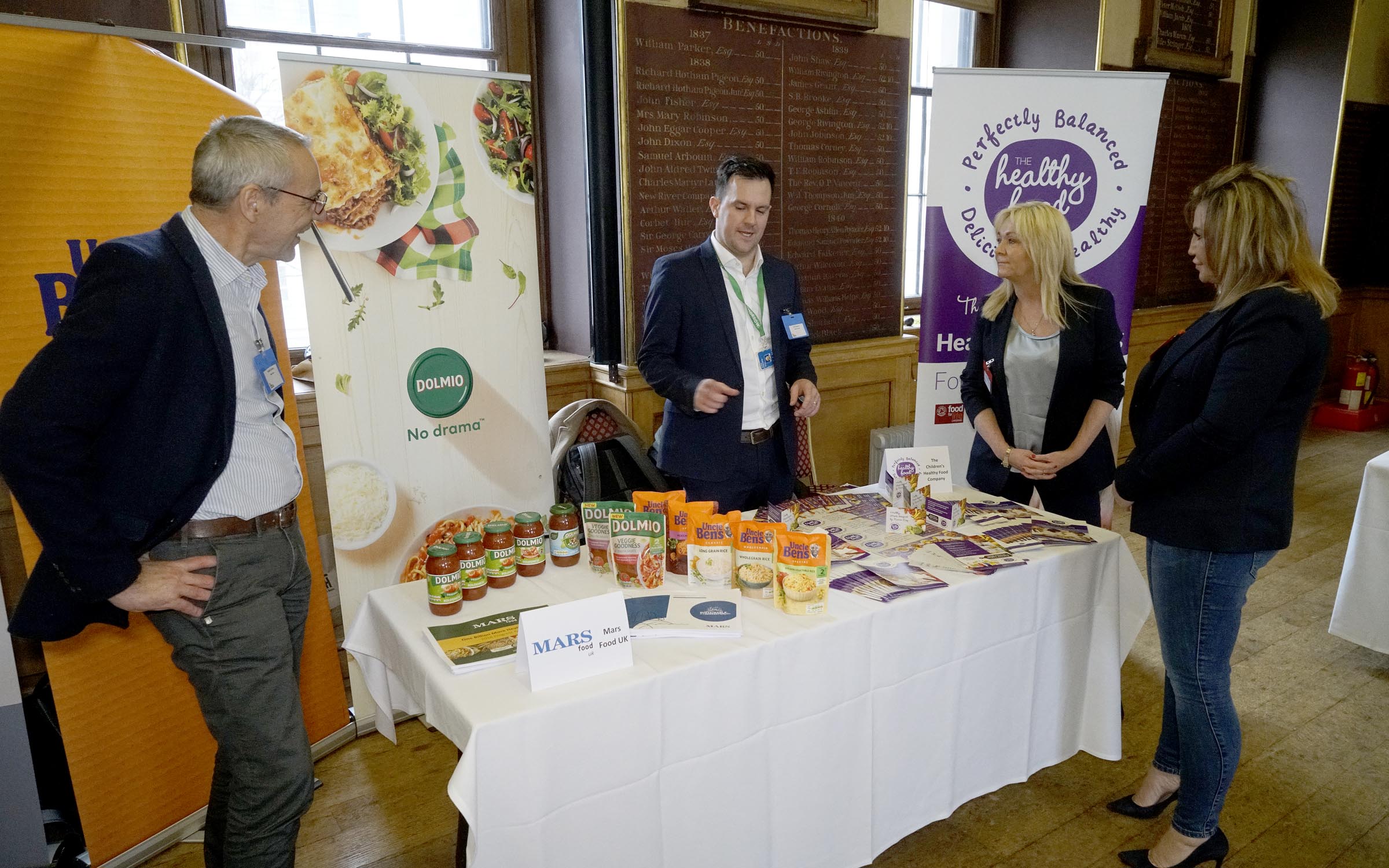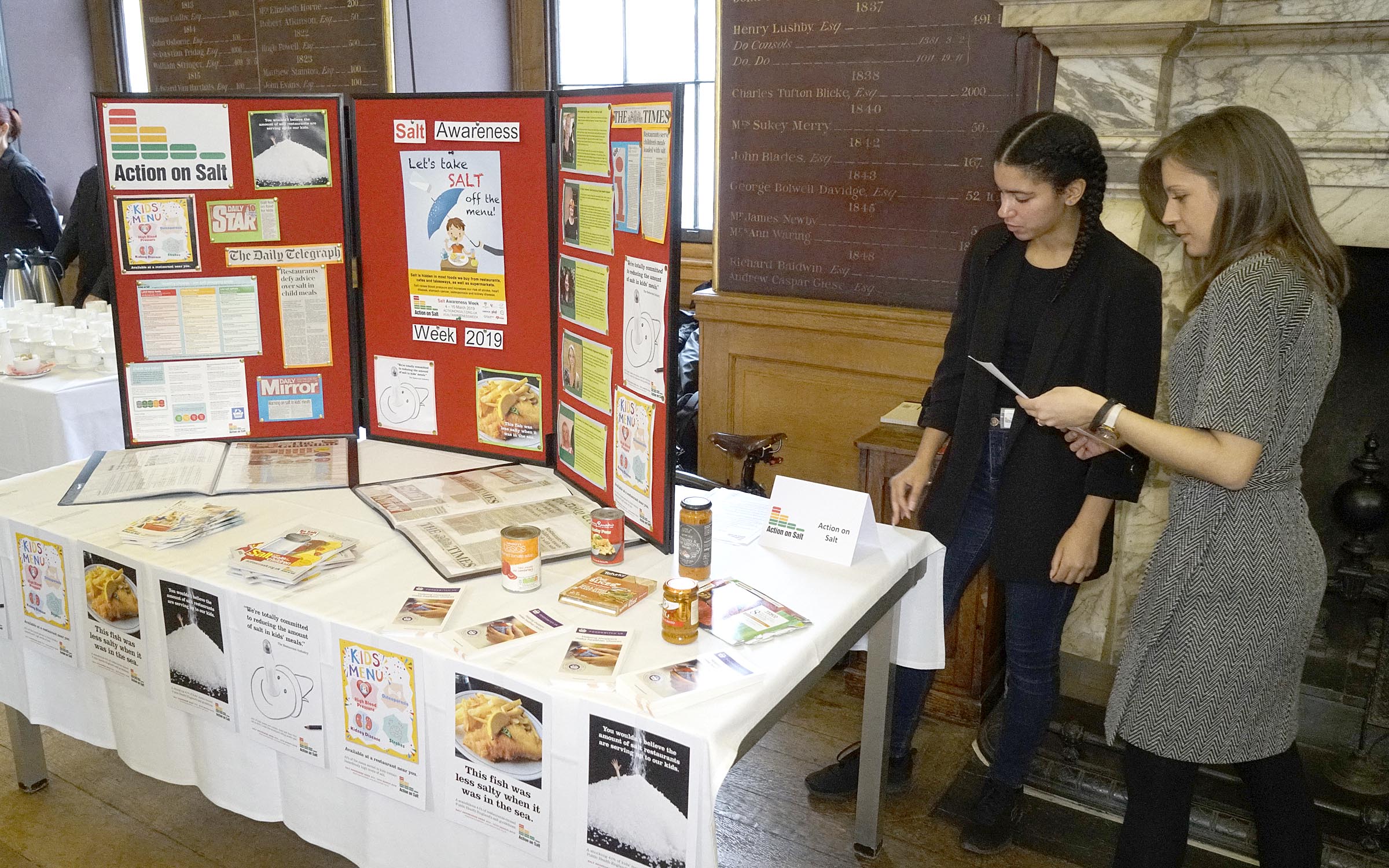Reception






To mark our 20th Salt Awareness Week, we had a new and exciting format for our annual Salt Awareness Week reception! This year, we hosted a panel discussion followed by a drinks reception at the stunning historical venue St Bartholomew's Hospital Great Hall, on Wednesday 6th March. The panel included:
- Dr Alison Tedstone, Chief Nutritionist, Public Health England
- Jenny Rosborough, Head of Nutrition, Jamie Oliver Group
- Kay Shearing, The Children's Healthy Food Company
- Prof Graham MacGregor, Chair of Action on Salt
- and panel moderator Barbara Crowther, Coordinator of the Children's Food Campaign
Zhané Turner, Action on Salt's intern, provides the following summary:
Prof Graham MacGregor, welcomed delegates and summarised Action on Salt’s survey of the salt content in children’s meals, served in popular chain restaurants and fast food outlets. Graham highlighted Action on Salt’s call to action – to make the salt content of children’s meals public and allow parents to make informed decisions about what they feed their families.
Barbara Crowther opened the panel discussion, expressing her shock that the saltiest meal in the survey had the equivalent salt content to 11 packets of salted crisps - no parent would want to sit and watch their children eat 11 packets of salted crisps in one sitting! However, Barbara noted that we would be happy to order that particular meal because we just don’t know the nutritional content. Children are much more sedentary now as part of the digital age, and more exposed to commercial influences, and are therefore more likely to consume excess calories and snack more. Barbara finished her introduction with a question to the panel - how do we build a better and healthier food environment for children where salt is concerned?
Optimising the nutrition content in the limited portion sizes consumed by children is a key concern for Kay Shearing. The Children’s Healthy Food Company provide a range of thirty dishes which have been independently assessed and they currently have the lowest salt content of children’s meals available on the market. The meals were also launched into the NHS 18 months ago and are the lowest salt meals available to children in hospital. Kay feels we should not compromise children’s development with things like salt, sugar and saturated fats and believes the next step to reduce children’s salt intake is to have a Children’s Minister at Cabinet level - a voice for children! - and legislation.
Jenny Rosborough shared that Jamie Oliver wanted the children’s menu at Jamie’s Italian to be a ‘safe place’, meaning that parents can be assured that the meal served to their child is nutritious, balanced, doesn’t go above a certain amount of salt, saturated fat and sugar and contains a minimum of two of the ‘5 a day’. Chefs at Jamie’s Italian are trained on nutrition through a Growing Leaders programme and are not allowed to season children’s meals with salt. Their meals are also analysed to ensure that the salt content does not exceed a certain amount. Jenny believes everyone must work together to reduce salt consumption in the UK - high salt meals should not exist on children’s menus and so Public Health England should consider legislation.
Graham MacGregor explained that voluntary salt reduction targets in the UK were very successful up until 2010 and many countries have followed suit as a result. However, our voluntary targets need very strong reinforcement, as the food industry don’t have to meet these targets, and won’t unless they are given the incentive that they are being watched and named and shamed if they do not conform. Many countries have now legislated the salt targets, like South Africa, Chile and Argentina, and Graham highlighted World Action on Salt and Health’s survey of the salt in children’s food available worldwide, which found that the salt content of some children’s meals in South Africa were amongst the lowest in the world and much lower than in the UK. Graham noted that everyone knows what needs to be done in regards to salt reduction, but nobody is currently prepared to do it. Graham stated the Secretary of State for Health must take action on salt reduction targets to prevent unnecessary deaths from stroke and heart disease.
The out of home (OOH) sector – which includes restaurants, fast food outlets, pubs and cafes - is not particularly engaged in improving the foods they offer, using the excuse that OOH meals and products are ‘just an occasional treat’. This is no longer the case, Alison Tedstone, Chief Nutritionist, Public Health England said, as on average we consume 20-30% of our calories in the OOH sector, including food delivery services. Alison highlighted that Public Health England produced a report in December 2018, analysing the progress made by retailers and OOH outlets towards the 2017 voluntary salt reduction targets. She noted that over 50% of targets were achieved by industry, and there is a long way to go to reach 100% compliance. Alison also noted that the targets set for OOH outlets were not as hard to achieve as those for retailers and manufacturers. Alison outlined the next steps for salt reduction in the UK. The Secretary of State for Health has stated that he wants to consider further actions on salt. In addition, we cannot make healthy choices without basic information, and for many OOH outlets, their information is only available online which doesn’t enable healthy choices. The promotion of products contributes to the excess consumption of salt, as products like savoury snacks are very highly promoted items and we might have a good intention to not buy those and feed them to our children, but when they’re on special offer it’s a very hard thing to resist. Alison also made reference to Action on Salt’s survey report, stating that it was disappointing to see what certain children’s meals can contain. PHE are committed to working towards further salt reduction, by continuing to provide evidence to the Department of Health and Social Care for potential legislative action.
The panel discussion was followed by a question and answer session. Questions focused on the following themes:
- Warning labels on less healthy foods
- The panel clarified that the current traffic light labelling scheme is not mandatory. However, following Brexit, the UK will have the opportunity to rethink nutrition labelling. The evidence will be reviewed and recommendations will be put forward to the Government
- The use of potassium-based salt replacers to reduce the salt content of food
- The panel stated that salt reduction targets had been set to help guide the food industry in adding less salt to their products. In children’s food it is important to reduce salt content to help their taste buds adapt to a less salty taste. However, the panel noted that the food industry is free to use potassium-based salt replacers in all products.
- Nutrition education in schools to help reduce salt intake
- The panel acknowledged that education is important and agreed that Ofsted should take more responsibility on this issue and ensure that food education is included in their framework
- The panel noted that increasing chef awareness of salt reduction was important and felt that restaurants should take more responsibility and ensure their chefs are trained
- Education for chefs to increase awareness of the importance of salt reduction in the out of home sector
To conclude the discussion, Barbara finished with a question to the panel ‘What would you like to see as having made progress in the near future?’
Jenny: More action on getting other companies to work towards salt reduction targets, to level out the playing field and getting salt consistently reduced across the board
Kay: More literature, knowledge and information for parents, so that they can make informed decisions on what to feed their children.
Alison: A re-energised salt reduction programme
Graham: Action. We know what needs doing, we just need to get on with it, so it’s very straightforward.


